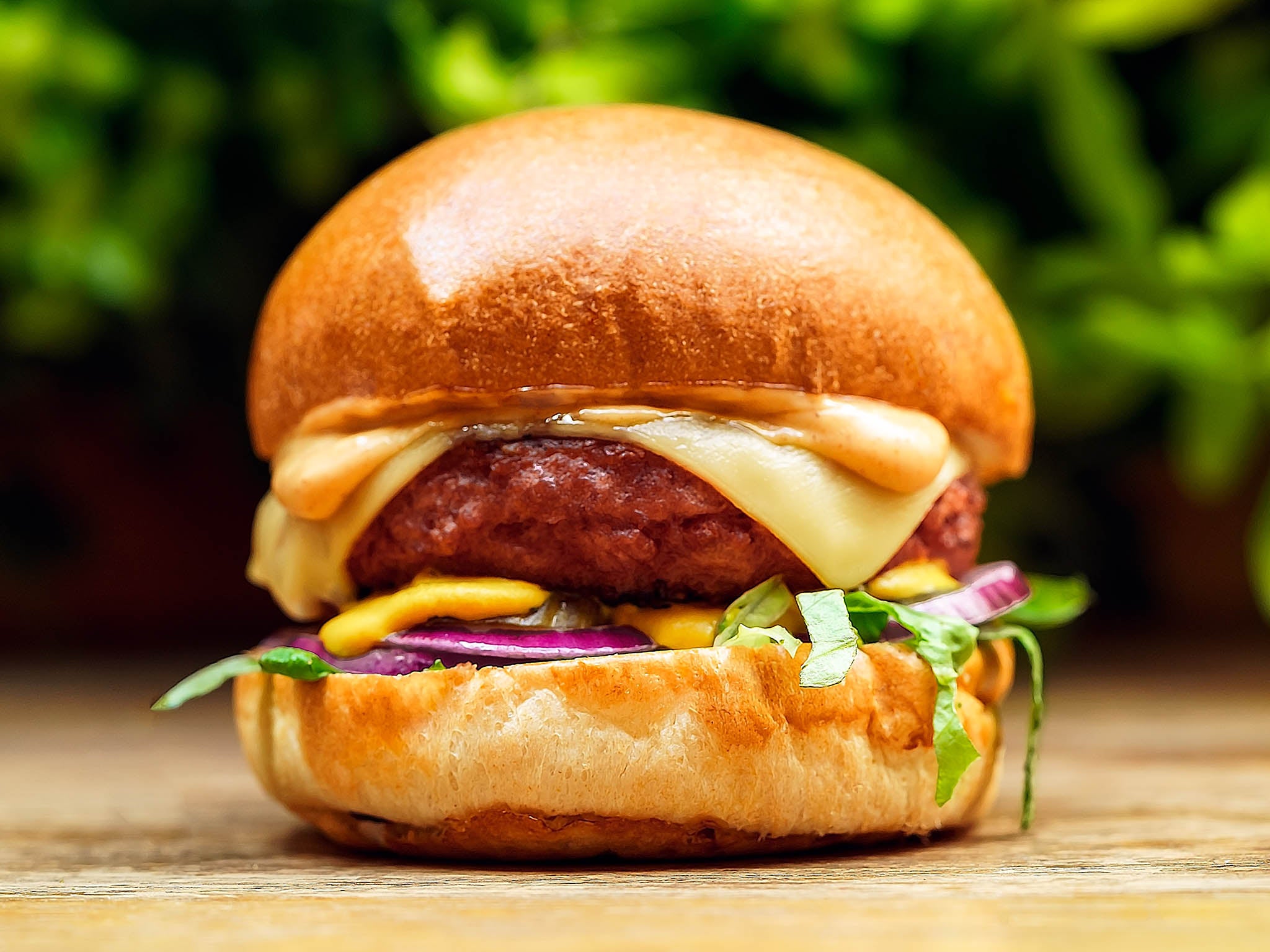Food fight: why is there a battle over burger labels?
After the European parliament declared ‘vegan burgers’ could be named so, Clare Finney looks at why there is so much debate over how meat and dairy-free products should be described

What’s in a name?” asked the European parliament last week. Would a plant-based burger by any other name seem just as burger-y? The answer, they concluded, was no.
The proposal, which would have banned the use of terms like “steak”, “sausage” and escalope as well as “burger” on labels for vegan or vegetarian alternatives, was voted down by 379 MEPs (with 284 for the proposal and 27 abstentions) on Friday 23 October – just in time for the UK’s first permanent vegan butcher, Rudy’s Vegan Butcher, to open its doors in London. Surely Ruth “Rudy” Mumma, who founded the butchers shop with her fiance Matthew Foster, must be relieved?
“To be honest, we didn’t think a huge amount about it. We do want people to have an awareness of what the product is emulating, and the best way to do that is to use the words which are out there already – but Matthew is very creative,” she says simply. “He’d have come up with great names whatever happened.”
Sure enough, their product list involves such semantic atrocities – to this English language lover’s mind – as “soysage”, “baycon” and “turk’y” as well as burger, meatballs and pastrami. Those who seek to prevent the producers of meat alternatives from appropriating the language of butchery are “just resisting change. They are reluctant to think about how things can be different,” she continues.
Both Mumma and Foster are former meat eaters. Veggie “discs” or “tubes” – the words floated to replace burgers and sausages – might be fine for products made out of, say, sweet potato and quinoa or aubergine and feta; but the point of Rudy’s is to create products that as far as humanly possible look, smell, feel and taste like meat.
So the EU’s decision seems logical – at least so far as vegans and companies who cater for them were concerned. “A victory for common sense” is how Louise Davies, head of policy at The Vegan Society, describes it to me. Butchers and livestock farmers, however, take a different stand on the matter. “All farmers want is clear and unambiguous labelling so that shoppers are not misled as to what they are buying,” says Christine McDowell. chief food chain adviser at the National Farmers’ Union. “This is therefore a missed opportunity for greater clarity.” A vegan burger might look like a beef burger; it might even taste like one. In blind taste tests, many people struggled to distinguish between the acclaimed Impossible Burger and a regular meat patty. Yet “all food products have their own nutritional values,” McDowell continues. “A veggie alternative will have very different nutritional properties to a beef burger – and so clear labelling is key.
Variations on the strapline “better for you, better for the planet” is commonplace amongst vegan and vegetarian products. Yet whilst the latter is more or less inarguable (even if you take the impact unsustainable sources of soy, palm, avocados and almonds have on the environment, the production of meat takes up more land and water and causes more environmental damage than any other single food product), the former does not always stack up.
“A lot of vegan products on the market at the moment are not all that healthy. They are high in salt and fat, and contain a lot of palm oil,” says Andrew Keeble, founder of sausages and burger company Heck. He is unusual because he has vested interests both sides of the meat divide: Heck make pork and chicken sausages and burgers in small batches on their farm in Yorkshire, but they also make a range that is entirely meat-free. His products are not high in fat or salt – and they don’t contain soy or palm, either: both controversial ingredients at the moment thanks to the contribution they make toward deforestation and levels of carbon in the atmosphere if produced and transported unsustainably.
He too welcomes the European parliament’s decision – the proposal was “classic, crazy EU in the first place,” he laughs – but believes the ruling, and subsequent media coverage, misses the real issue here. “I think a lot of farmers feel entirely disrespected by the food industry,” he says seriously. Crazy as it seemed, it was no coincidence that the proposal was brought forward by a French farmer who was also an MEP. “There are a lot of companies – vegan, vegetarian and meat companies – who use farm, farmer or farm shop in their name and branding when they have nothing to do with a farm. And that isn’t fair on farmers, or on the consumers.” All too often these are venture capital-backed businesses which are jumping on the rapidly accelerating vegan bandwagon and cynically appropriating the language of craft and rurality as they go. “It’s disingenuous,” Keeble continues. “These start-up businesses have a lot of money behind them, and they make a lot of noise, and we think things should be really clear.” If there are no farms involved, and the ingredients have been produced or manufactured hundreds of miles away and then transported, “that should be clear on the label”. For a vegan or vegetarian sausage company to ape the tone and language of a farmhouse pork sausage producer feels, to farmers, “like a slap in the face”.
“That French farmer wanted to protect the meat he works hard to produce and rear – and that is fair enough,” he says – even if it wasn’t the best way of going about it. Of course, the big, densely stocked industrialised farming systems should be held to account, but at the moment “all meat gets tarred with the same brush. That which is grown extensively, locally, in a high welfare system is not the same as that from massive feedlock systems”. Whether you’re buying pork sausages or meat-free sausages Keeble advises looking beyond the most obvious label to the manufacture and the source.
So far as producers like Keeble are concerned, this is “sort of a non-story” – not least because we’re set to leave the EU in under two months. Yet the European parliament did throw something of a curveball for vegans and vegan food manufacturers toward the end. Though the “burger ban” amendment was voted down, MEPs also voted to ban any indirect reference to dairy products on the labels on plant-based foods, meaning that descriptions such as yoghurt-style, milk-like or cream imitation are no longer allowed.
“Plant-based products are already banned from using terms like ‘milk’ or ‘butter’ – despite there being not a single piece of evidence to suggest consumers are confused by these words,” responds Davies of the Vegan Society. “Adding in a further restriction to stop terms that liken plant-based foods to dairy, such as ‘alternative’ or ‘style’, is going to stop manufacturers from accurately describing their products, and means that consumers actively seeking to reduce their environmental impact and shop more ethically will be poorly informed.”
Even putting the ideological vegan-non vegan divide to one side, it’s a valid argument. Plenty of people are lactose intolerant, and even many who aren’t are looking to reduce our consumption of animal products in the name of the environment.
If the EU wants to help people transition toward a greener way of living, making this harder seems a bit daft. “The plant-based sector will be forced to create new words to describe products such as vegan cheese or vegan cream, despite these foods being created with the sole intention to imitate their dairy counterparts,” Davies continues.
“Vegan alternatives will continue to be called by their conventional names by recipe creators, consumers and on internet searches, making this anti-vegan ban illogical and ineffective.” As it stands, ditching the dairy names whilst failing to clear up any confusion around sourcing and sustainability on labels helps neither consumers nor the farmers and producers trying to do right.
Join our commenting forum
Join thought-provoking conversations, follow other Independent readers and see their replies
Comments



Bookmark popover
Removed from bookmarks